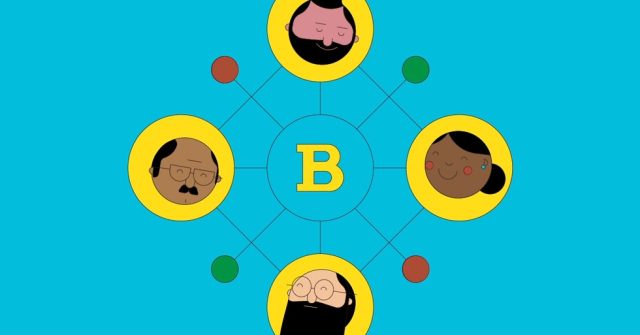Depending on who you ask, blockchains are either the most important technological innovation since the internet or a solution looking for a problem.
The original blockchain is the decentralized ledger behind the digital currency bitcoin. The ledger consists of linked batches of transactions known as blocks (hence the term blockchain), and an identical copy is stored on each of the roughly 60,000 computers that make up the bitcoin network. Each change to the ledger is cryptographically signed to prove that the person transferring virtual coins is the actual owner of those coins. But no one can spend their coins twice, because once a transaction is recorded in the ledger, every node in the network will know about it.
The idea is to both keep track of how each unit of the virtual currency is spent and prevent unauthorized changes to the ledger. The upshot: No bitcoin user has to trust anyone else, because no one can cheat the system.
Other digital currencies have imitated this basic idea, often trying to solve perceived problems with bitcoin by building new cryptocurrencies on new blockchains. But advocates have seized on the idea of a decentralized, cryptographically secure database for uses beyond currency. Its biggest boosters believe blockchains can not only replace central banks but usher in a new era of online services that would be impossible to censor. These new-age apps, advocates say, would be more answerable to users and outside the control of internet giants like Google and Facebook.
Unless, of course, Facebook runs away with the idea itself. In June, Facebook announced Libra, a new blockchain that will support a digital currency. Unlike the thousands of anybodys who run Bitcoin nodes, it will be controlled by an association comprised of just 100 companies and NGOs. Libra is certainly a challenge to central banks, not least because it’s a privately controlled monetary system that will span the globe. But replacing government with corporations is not exactly the revolution that enthusiasts imagined blockchain would bring. So far, the crypto community is divided on whether Libra is a good thing. Some see Facebook’s effort as a corruption of a technology designed to ensure that you don’t need to trust your fellow users—or any central authority. Others are celebrating it as the moment that blockchain goes mainstream.
Other so-called “private” blockchains, like Libra, are growing in popularity. Big financial services companies, including JP Morgan and the Depository Trust & Clearing Corporation, are experimenting with blockchains and blockchain-like technologies to improve the efficiency of trading stocks and other assets. Traders buy and sell stocks rapidly using current technology, of course, but the behind-the-scenes process of transferring ownership of those assets can take days. Some technologists believe blockchains could help with that.
Blockchains also have potential applications in the seemingly boring world of corporate compliance. After all, storing records in an immutable ledger is a pretty good way to assure auditors that those records haven’t been tampered with. This might be good for more than just catching embezzlers or tax cheats. Walmart, for example, is using an IBM-developed blockchain to track its supply chain, which could help it trace the source of food contaminants. Many other experiments have emerged: Voting on the blockchain. Land records. Used cars. Real estate. Streaming content. Hence the phrase “xxx on the blockchain” as a catch-all for the enduring hype cycle. The question is, if one organization (say, Walmart) has control of the data, did it really need blockchain at all?
It’s too early to say which experiments will stick. But the idea of creating tamper-proof databases has captured the attention of everyone from anarchist techies to staid bankers.
The First Blockchain
The original bitcoin software was released to the public in January 2009. It was open source software, meaning anyone could examine the code and reuse it. And many have. At first, blockchain enthusiasts sought to simply improve on bitcoin. Litecoin, another virtual currency based on the bitcoin software, seeks to offer faster transactions.
One of the first projects to repurpose the bitcoin code to use it for more than currency was Namecoin, a system for registering “.bit” domain names. The traditional domain-name management system—the one that helps your computer find our website when you type wired.com—depends on a central database, essentially an address book for the internet. Internet-freedom activists have long worried that this traditional approach makes censorship too easy, because governments can seize a domain name by forcing the company responsible for registering it to change the central database. The US government has done this several times to shut sites accused of violating gambling or intellectual-property laws.
Namecoin tries to solve this problem by storing .bit domain registrations in a blockchain, which theoretically makes it impossible for anyone without the encryption key to change the registration information. To seize a .bit domain name, a government would have to find the person responsible for the site and force them to hand over the key.
In 2013, a startup called Ethereum published a paper outlining an idea that promised to make it easier for coders to create their own blockchain-based software without having to start from scratch, without relying on the original bitcoin software. In 2015 the company released its platform for building “smart contracts,” software applications that can enforce an agreement without human intervention. For example, you could create a smart contract to bet on tomorrow’s weather. You and your gambling partner would upload the contract to the Ethereum network and then send a little digital currency, which the software would essentially hold in escrow. The next day, the software would check the weather and then send the winner their earnings. A number of “prediction markets” have been built on the platform, enabling people to bet on more interesting outcomes, such as which political party will win an election.
So long as the software is written correctly, there’s no need to trust anyone in these transactions. But that turns out to be a big catch. In 2016, a hacker made off with about $50 million worth of Ethereum’s custom currency intended for a democratized investment scheme where investors would pool their money and vote on how to invest it. A coding error allowed a still unknown person to make off with the virtual cash. Lesson: It’s hard to remove humans from transactions, with or without a blockchain.
















